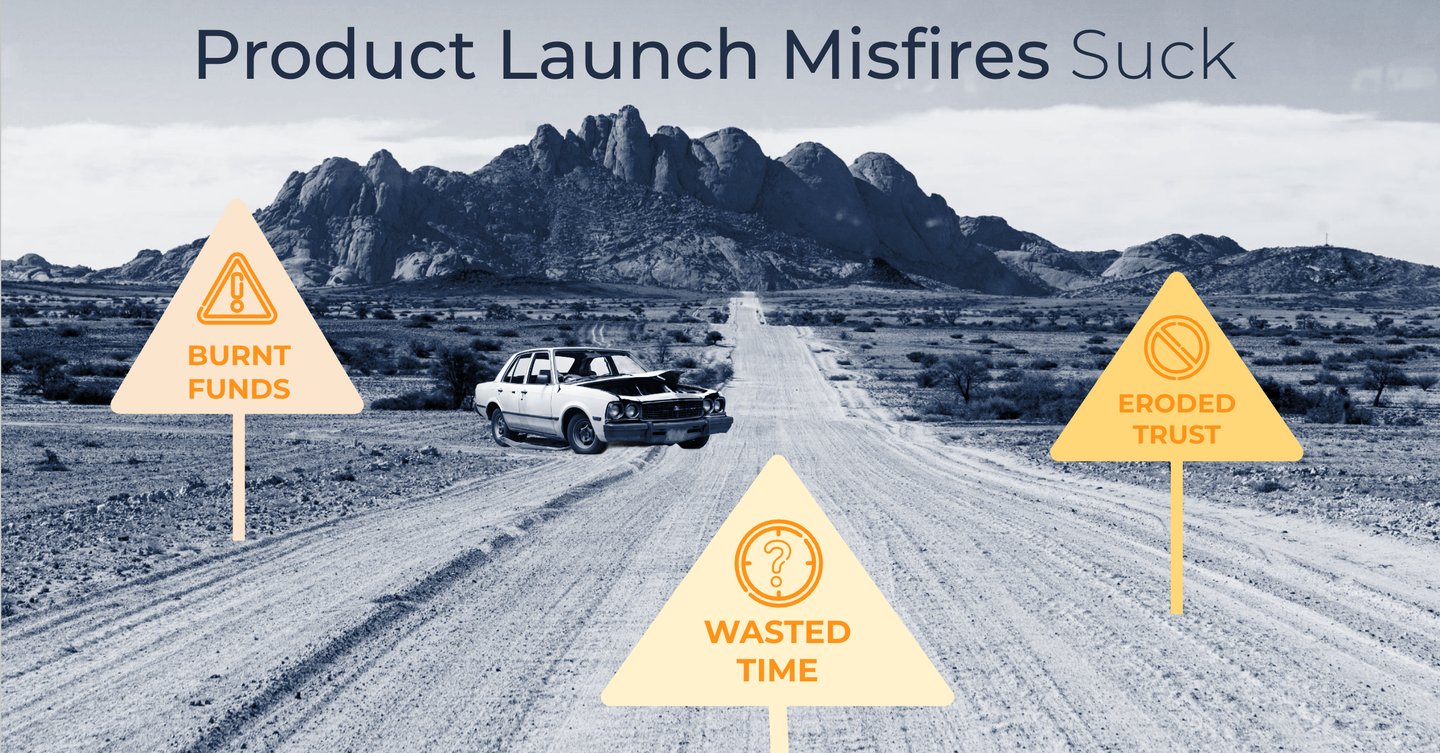4 Ways to Fix Product Launch Misfires
MARKET RESEARCHPRODUCT VISIONGTM MOTIONLAUNCH ISSUES


If you’ve worked in tech for a bit, you’ve experienced a launch that didn’t reach its final destination. The car starts, engine sputters, fails to gain speed, and ends up in the junkyard of forgettable SKUs 😵💫. One team may even get blamed (any marketers heard that the launch message sucked?), then people move on after a week or two of amnesia-inducing PTO.
Having led and worked on launches as part of product marketing, product, partnerships, solutions, and sales teams, I’ve learned this: it’s never just one thing, feature, or team that causes failure. Launches start "offroading" because of internal engine misfires—a series of interconnected breakdowns between teams that prevent you from getting into gear, staying aligned, and hitting your goals.
Everyone is racing faster and faster to build AI products, and with AI, are being told to run on fumes in terms of headcount. If your engine isn’t finely tuned, speed only gets you to failure faster, heading in the wrong direction due to unclear target markets, or recreating the wheel each launch without process. So let’s talk about the four major launch engine misfires we see—and how to fix them. If you're fixing misfires or have lessons from the road, reach out, and let's swap stories. 🚗


Misfire 1: Foggy Windshield (Unclear Market View)
When teams can’t see the road ahead in terms of target market and audiences, it’s usually because the windshield is fogged up by siloed data. CRM insights, customer feedback, financial data — are scattered across systems and teams. Nobody has a clear view and therefore disagrees on where you're going, or loses visibility along the way.
⚠️Warning Signs:
Direction changes constantly, no one knows the "true" customer
Win rates drop, and gears slow as sales vs. product friction rises
Marketing throws $$ and sales spend time with the wrong audiences
Engine Fix: Unified & Shared Market Insights
Gather a pit crew across teams. Build a “Voice of Market” dashboard that consolidates insights into one shared view. Automate updates where possible with AI tools—no more digging through dusty docs. If that’s too big of a project, try a tune-up.
🔧 Tune Up:
Make a deck called “2025 Voice of Market Report” (Request Free Template)
Assign leaders across the company to present on an all-hands
Help them with a single data person to find and unify insights
2: Misfiring Cylinders (Problem-Feature Parity)
Without the right fuel-air mix (aka customer problems + clear requirements), your engine chokes. Some teams hoard knowledge. Experts don’t have time to document and share because they are too busy building, solutioning, and selling.
⚠️Warning Signs:
Endless feature requests, unclear priorities
Delays in onboarding or adoption
Constant customization requests from new markets
Fix: Clear Problems & Ranked Requirements
Run a full diagnostic on your roadmap to market fit. Draft Market Requirement Docs (Request MRD template) with cross-functional experts and finance to define use cases, value, and revenue impact. Prioritize what drives the most business horsepower.
🔧Tune Up:
Work with best customers on ”future demos” of what they want
Create close lost reports, group roadmap features, and add lost revenue
Send a survey to teams/customers and rank requirements in priority impact
Misfire 3: Crooked Steering (Unclear Roadmap)
Without a clear direction, you veer off-course. Feature Creep pulls the wheel left, while one-off projects tug right. The product portfolio ends up bloated and confusing to position, market, sell and service.
⚠️Warning Signs:
Flagship products sell; the rest fade
Lots of launches, no story tying them together
Sales sell the wrong roadmap
Fix: Validated, Value-Based Product Vision
Form a "Center of Innovation" to steer vision and roadmap clarity. Use market insights and customer ideas to shape vision messaging and create roadmap experiences and content of the future to test the direction with customers before you build. Leverage this at events to sell down the road, and get feedback along with buy-in.
🔧Tune Up:
Work across PM/PMM/Sales to generate Vision Deck.
Create a roadmap channel in Slack/etc for all questions and requests.
Enable a team of solutions experts to scale product teams
Misfire 4: Wobbly Wheels (Crossing Lanes)
You built a great car—but the wheels fall off when it hits the track. Sales, marketing, and success teams aren’t in sync, and the ride gets bumpy for your customers.
⚠️Warning Signs:
Low content engagement and internal confusion
Sales avoid selling new products
Customer adoption moves at a crawl
Fix: Unified Experience & Go-To-Market
Without a clear direction, you veer off-course. Feature Creep pulls the wheel left, while one-off projects tug right. The product portfolio ends up bloated and confusing to position, market, sell and service, so you overlay teams to help.
🔧Tune Up:
Analyze previous launch content, delete low performers
Create an interactive experience with all launch content behind it
Have ongoing office hours to scale deal-specific support
Tune Your Launch Engine
You don’t need a brand-new vehicle—just regular maintenance. Start with your foggy windshield (market insights), and tune as you go. Before your next launch, make a quick pit stop to:
Rightsize Launch Plans: Use tiers to scale effort and avoid overdrive
Clarify the Lanes: Improve process collaboratively, not top-down
Focus on Handoffs: Smooth transitions between teams = smooth delivery
Unite a Launch Hub: Launches span teams, your tools should too
Launch Engine can be an extended part of your launch pit crew to help you keep it firing on all cylinders. Your engine has what it takes, but like a car needs constant maintenance. Set up some time to chat about what you can do for quick wins or big engine overhauls.
